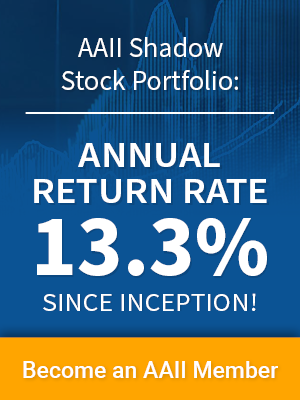Based on key financial metrics such as the price-to-sales ratio, shareholder yield and the price-earnings ratio, the following 3 stocks made the list for top value stocks in the Pharmaceuticals industry. Those looking for value stocks to add to their portfolio may want to use this list as a starting point for further investment research.
Why Focus on Undervalued Pharmaceuticals Stocks?
Value investors seek to buy stocks at a discount to their intrinsic value. Long-term returns show that such strategies are advantageous. Value stocks, as a group, tend to outperform growth stocks over extended periods of time. Typically, value investors perform financial analysis of numerous metrics, don’t follow the herd and are long-term investors.
AAII’s A+ Investor Value Grade is derived from a stock’s Value Score. The Value Score is the percentile rank of the average of the percentile ranks of the price-to-sales ratio, price-earnings ratio, enterprise-value-to-EBITDA (EV/EBITDA) ratio, shareholder yield, price-to-book-value ratio and price-to-free-cash-flow ratio. The score is variable, meaning it can consider all six ratios or, should any of the six ratios not be valid, the remaining ratios that are valid. To be assigned a Value Score, stocks must have a valid (non-null) ratio and corresponding ranking for at least two of the six valuation ratios.
What Goes Into AAII’s Value Grade?
Stock evaluation requires access to huge amounts of data as well as the knowledge and time to sift through it all, make sense of financial ratios, read income statements and analyze recent stock movement. AAII created A+ Investor, a robust data suite that condenses data research in an actionable and customizable way suitable for investors of all knowledge levels, to help investors with that task.
AAII’s proprietary stock grades come with A+ Investor. These offer intuitive A–F grades for more than just value. It is possible for a stock to appear cheap based on one valuation metric but appear expensive on another. It is also possible for one valuation ratio to be associated with outperforming stocks during certain periods of time but not others. Some stocks may even have null values for certain metrics like the price-earnings ratio or the price-to-book ratio but not others. An example of this would be a company with losses instead of profits or a negative book value because of heavy borrowing. Negative earnings or book value result in non-meaningful ratios that are left blank or null.
Click the button below to learn more about A+ Investor and subscribe today.

3 Undervalued Pharmaceuticals Stocks
Of course, there are countless value stocks that are worth mentioning, but this is a concise list of the top 3 undervalued stocks in the Pharmaceuticals industry for Tuesday, November 18, 2025. Let’s take a closer look at their individual scores to see how they measure up against each other and the Pharmaceuticals industry median.
| Company | Ticker | Price/Sales | Price/Earnings | EV/EBITDA | Shareholder Yield | Price/Book Value | Price/Free Cash Flow | Value Grade |
| Bristol-Myers Squibb Company | BMY | 1.98 | 15.8 | 6.9 | 4.9% | 5.14 | 9.2 | B |
| CorMedix Inc. | CRMD | 3.14 | 4.4 | 6.5 | (29.1%) | 2.09 | 9.1 | B |
| Pacira BioSciences, Inc. | PCRX | 1.50 | 50.7 | 9.2 | 4.5% | 1.41 | 8.7 | B |
The Value Grade is assigned based on how each stock’s composite valuation compares to all other stocks.
The process for assigning grades starts with each variable for a given stock. The percentile rankings for all valid ratios that a stock has are calculated. So, for instance, a stock could have a price-to-book ranking in the 43rd percentile, a price-earnings ranking in the 67th percentile, a price-to-sales ranking in the 23rd percentile, etc. Then, those rankings are averaged for each stock. (A minimum of two valid variables are required, though all six will be used if available.)
Once the average of the individual variables is calculated, that average is ranked against all stocks. Put another way, each stock’s composite valuation is compared to all other stocks. These ranks are then sorted into quintiles from the cheapest 20% (a grade of A) to the most expensive 20% (a grade of F).
As always, we recommend that you conduct proper due diligence and research before investing in any security. We also suggest that investors utilize numerous grades, not just value, when it comes to deciding whether a company is a good fit for their allocation needs.
Bristol-Myers Squibb Company’s Value Grade
Value Grade:
| Metric | Score | BMY | Industry Median |
| Price/Sales | 50 | 1.98 | 3.14 |
| Price/Earnings | 42 | 15.8 | 19.7 |
| EV/EBITDA | 18 | 6.9 | 9.2 |
| Shareholder Yield | 17 | 4.9% | (9.4%) |
| Price/Book Value | 80 | 5.14 | 2.59 |
| Price/Free Cash Flow | 23 | 9.2 | 11.4 |
Bristol-Myers Squibb Company discovers, develops, licenses, manufactures, markets, distributes, and sells biopharmaceutical products worldwide. It offers products for oncology, hematology, immunology, cardiovascular, neuroscience, and other areas. The company’s products include Eliquis for reduction in risk of stroke/systemic embolism in non-valvular atrial fibrillation and for the treatment of DVT/PE; Opdivo for various anti-cancer indications; Pomalyst/Imnovid for multiple myeloma; Orencia for active rheumatoid arthritis and psoriatic arthritis; and Sprycel to treat patients with Philadelphia chromosome-positive chronic myeloid leukemia. It also provides Yervoy for the treatment of patients with unresectable or metastatic melanoma; Empliciti for the treatment of relapsed/refractory multiple myeloma; Abecma for the treatment of patients with relapsed or refractory multiple myeloma; Reblozyl to treat anemia; Opdualag for the treatment of unresectable or metastatic melanoma; and Zeposia to treat relapsing forms of multiple sclerosis. In addition, the company offers Breyanzi for the treatment of patients with relapsed or refractory large B-cell lymphoma; Cobenfy to treat schizophrenia in adults; Krazati for the treatment of adult patients with KRASG12C-mutated locally advanced or metastatic non-small cell lung cancer (NSCLC); Camzyos to treat symptomatic obstructive HCM to improve functional capacity and symptom; Sotyktu for the treatment of moderate-to-severe plaque psoriasis; Augtyro for the treatment of locally advanced or metastatic ROS1-positive NSCLC; Revlimid, an oral immunomodulatory drug to treat multiple myeloma; and Abraxane for the treatment of breast cancer, NSCLC and pancreatic cancer. It sells products to wholesalers, distributors, pharmacies, retailers, hospitals, clinics, and government agencies. The company was formerly known as Bristol-Myers Company. Bristol-Myers Squibb Company was founded in 1887 and is headquartered in Princeton, New Jersey.
Stocks with a Value Score from 81 to 100 are considered deep value, those with a score between 61 and 80 are value and so on.
Bristol-Myers Squibb Company has a Value Score of 67, which is considered to be undervalued.
When you look at Bristol-Myers Squibb Company’s price-to-sales ratio at 1.98 compared to the industry median at 3.14, this company has a lower price relative to revenue compared to its peers. This could make Bristol-Myers Squibb Company’s stock more attractive for value investors.
Bristol-Myers Squibb Company’s price-earnings ratio is 15.80 compared to the industry median at 19.65. This means it has a lower share price relative to earnings compared to its peers. This could make Bristol-Myers Squibb Company more attractive for value investors.
Now, let’s assess Bristol-Myers Squibb Company’s EV/EBITDA ratio, also known as enterprise multiple. At 6.9, when compared to the industry median of 9.2, the company may be considered undervalued in relation to its peers. Value investors could use the enterprise multiple to identify stocks that are considered overvalued or undervalued relative to their industry.
Shareholder yield is the sum of a stock’s dividend yield (paid over previous 12 months minus special dividends) and the percentage of net share buybacks over the previous 12 months. Bristol-Myers Squibb Company’s shareholder yield is higher than its industry median ratio of (9.35%). Value investors may look for an attractive shareholder yield because it can be a powerful tool for identifying if the company has a good management team.
As one of the most common value metrics, the price-to-book ratio evaluates a company’s current market price relative to its book value. Bristol-Myers Squibb Company’s price-to-book ratio is higher than its industry median ratio of 2.59. This could make Bristol-Myers Squibb Company less attractive to investors looking for a new addition to their portfolio.
Lastly, let’s take a look at Bristol-Myers Squibb Company’s price-to-free-cash-flow ratio (P/FCF), which can indicate a company’s market value relative to its operating cash flow. Bristol-Myers Squibb Company’s price-to-free-cash-flow ratio is lower than its industry median ratio of 11.40. This could make Bristol-Myers Squibb Company more attractive because the lower P/FCF ratio indicates that Bristol-Myers Squibb Company is undervalued. The P/FCF ratio metric can also be viewed over a long-term time frame to see if the company's cash flow to share price value is generally improving or worsening.
CorMedix Inc.’s Value Grade
Value Grade:
| Metric | Score | CRMD | Industry Median |
| Price/Sales | 66 | 3.14 | 3.14 |
| Price/Earnings | 4 | 4.4 | 19.7 |
| EV/EBITDA | 15 | 6.5 | 9.2 |
| Shareholder Yield | 86 | (29.1%) | (9.4%) |
| Price/Book Value | 54 | 2.09 | 2.59 |
| Price/Free Cash Flow | 22 | 9.1 | 11.4 |
CorMedix Inc., a biopharmaceutical company, focuses on developing and commercializing therapeutic products for life-threatening diseases and conditions in the United States. Its lead product candidate is DefenCath, an antimicrobial catheter lock solution to reduce the incidence of catheter-related bloodstream infections in adult patients with kidney failure. The company was formerly known as Picton Holding Company, Inc. and changed its name to CorMedix, Inc. in January 2007. CorMedix Inc. was incorporated in 2006 and is based in Berkeley Heights, New Jersey.
Stocks with a Value Score from 81 to 100 are considered deep value, those with a score between 61 and 80 are value and so on.
CorMedix Inc. has a Value Score of 62, which is considered to be undervalued.
CorMedix Inc.’s price-earnings ratio is 4.4 compared to the industry median at 19.7. This means that it has a lower price relative to its earnings compared to its peers. This makes CorMedix Inc. more attractive for value investors.
CorMedix Inc.’s price-to-book ratio is higher than its peers. This could make CorMedix Inc. less attractive for value investors when compared to the industry median at 2.59.
You can read more about CorMedix Inc.’s key financial metrics like shareholder yield, price-to-free-cash-flow and EV/EBITDA ratio, or learn more about its Momentum and Growth Grades, by subscribing to A+ Investor.
Pacira BioSciences, Inc.’s Value Grade
Value Grade:
| Metric | Score | PCRX | Industry Median |
| Price/Sales | 43 | 1.50 | 3.14 |
| Price/Earnings | 86 | 50.7 | 19.7 |
| EV/EBITDA | 31 | 9.2 | 9.2 |
| Shareholder Yield | 19 | 4.5% | (9.4%) |
| Price/Book Value | 41 | 1.41 | 2.59 |
| Price/Free Cash Flow | 21 | 8.7 | 11.4 |
Pacira BioSciences, Inc. engages in the development, manufacture, marketing, distribution, and sale of non-opioid pain management and regenerative health solutions to healthcare practitioners in the United States. The company offers EXPAREL, a bupivacaine liposome injectable suspension for postsurgical pain management; ZILRETTA, a triamcinolone acetonide extended-release injectable suspension indicated for the management of osteoarthritis and knee pain; and iovera system, a non-opioid handheld cryoanalgesia device used to deliver controlled doses of cold temperature to targeted nerves to produce neurolytic block that interrupts the pain-transmitting signals of a peripheral nerve. It also develops PCRX-201, a novel gene therapy vector platform enabling local administration of genetic medicines with the potential to treat large prevalent diseases like osteoarthritis. The company has a development and commercialization, and supply agreement with Aratana Therapeutics, Inc. for NOCITA, a bupivacaine liposome injectable suspension product for use in animals. The company was formerly known as Pacira Pharmaceuticals, Inc. and changed its name to Pacira BioSciences, Inc. in April 2019. Pacira BioSciences, Inc. was incorporated in 2006 and is headquartered in Tampa, Florida.
Stocks with a Value Score from 81 to 100 are considered deep value, those with a score between 61 and 80 are value and so on.
Pacira BioSciences, Inc. has a Value Score of 64, which is considered to be undervalued.
Pacira BioSciences, Inc.’s price-earnings ratio is 50.7 compared to the industry median at 19.7. This means that it has a higher price relative to its earnings compared to its peers. This makes Pacira BioSciences, Inc. less attractive for value investors.
Pacira BioSciences, Inc.’s price-to-book ratio is higher than its peers. This could make Pacira BioSciences, Inc. less attractive for value investors when compared to the industry median at 2.59.
You can read more about Pacira BioSciences, Inc.’s key financial metrics like shareholder yield, price-to-free-cash-flow and EV/EBITDA ratio, or learn more about its Momentum and Growth Grades, by subscribing to A+ Investor.

Other Pharmaceuticals Stock Grades
Value is just one of the five Stock Grades included in our A+ Investor service. AAII members can see the top-graded stocks—those with grades of A or B for value, growth, momentum, earnings estimate revisions and quality—on the A+ Stock Grades Screener.
Also, if you want full access to all of AAII’s premium services, you can subscribe to one convenient bundled plan called AAII Platinum where you can try out A+ Investor, AAII Dividend Investing, the Stock Superstars Report, Growth Investing and VMQ Stocks. With the other premium services, you can dive deep into additional metrics, portfolios, commentary and information about Pharmaceuticals stocks as well as other industrys.
Choosing Which of the 3 Best Pharmaceuticals Stocks Is Right for You
Choosing which value stocks to invest in will ultimately depend on your individual goals and allocation; however, comparing similar value stocks in the same industry can help you analyze which might be better investments for you in the long run. So, let’s take a look at the Value Grade for all of our stocks.
- Bristol-Myers Squibb Company stock has a Value Grade of B.
- CorMedix Inc. stock has a Value Grade of B.
- Pacira BioSciences, Inc. stock has a Value Grade of B.
Now that you have a bit more background about each of the 3 undervalued stocks in the Pharmaceuticals industry as well as their overall grades, it’s time for you to conduct additional research to see if these could fit your portfolio needs based on your goals and risk tolerance. AAII can help you figure out both and identify which investments align with what works best for you.
We do so through a program of education that teaches you to invest for yourself and become an effective manager of your own wealth—no more relying on others for your financial independence. You can rely on AAII for timeless articles on financial planning and stock-picking, unbiased research and actionable analysis that makes you a better investor.
A+ Investor adds to that qualitative teaching by giving you a powerful data suite that helps you whittle down investment decisions to find stocks, exchange-traded funds (ETFs) or mutual funds that meet your needs.

Additional Resources About Pharmaceuticals Stocks
Want to learn more about Pharmaceuticals stocks to see if they could be the right investment for you? Check out some additional resources and articles to help you on your financial journey.
- 3 Undervalued Pharmaceuticals Stocks for Tuesday, November 18
- Is AstraZeneca PLC (AZN) Overvalued?
- Is Johnson & Johnson (JNJ) Overvalued?
- Is Novartis AG (NVS) Overvalued?
AAII Disclaimer
We make no representations or warranties that any investor will, or is likely to, achieve profits similar to those shown, because past, hypothetical or simulated performance is not necessarily indicative of future results. Before making an investment decision, you should consider your circumstances and whether the information on our content is applicable to your situation. This information was prepared in good faith and we accept no liability for any errors or omissions. The full disclaimer can be read here.
 Included With AAII Platinum
Included With AAII Platinum
at only 6.9%
Gain Since Inception. Data as of 12/31/2024.

769.3% Stock Superstars Portfolio Total Return Since Inception

U.S. Index ETF (IYY)
SSR Group 3 O'Shaughnessy portfolio has a 411.2% gain since inception performance compared to IYY at only 119.1%% Performance as of 11/29/24.
FREE REPORT

BECOME A MEMBER FOR ONLY $2
Get access to powerful investment discovery tools and a wealth of investment education to help you achieve your financial goals.




